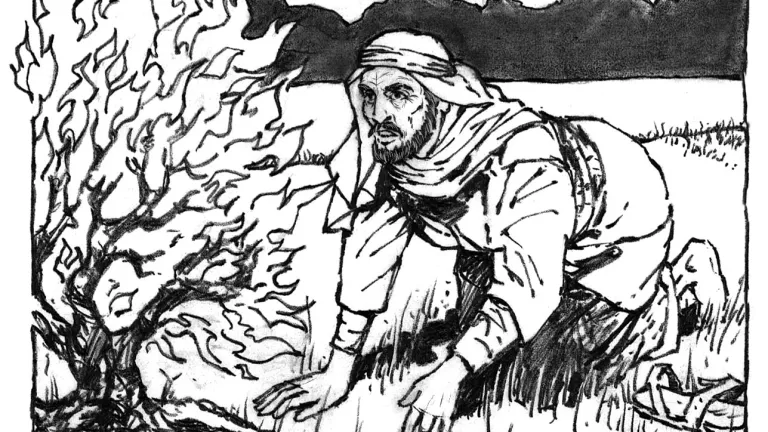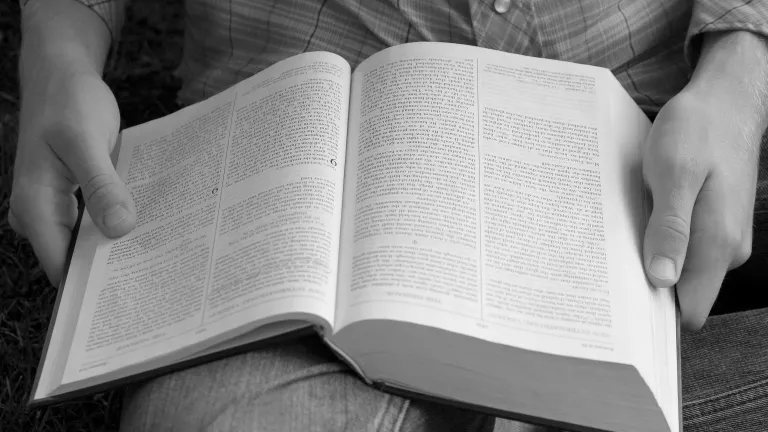Mankind's Choice: Freedom or Slavery?
Captivity begins with human choice, spirit and character. Discover how we can be freed from spiritual slavery.
The struggle for freedom has long been a popular theme in literature, songs and movies. Recently The Prince of Egypt, an animated feature film, retold the story of Moses and how he led the Israelites out of slavery in Egypt.
"But in this case as in so many others, the Book is better than the movie" quipped one newspaper critic. While the movie has done well at the box office, it doesn't compare with the depth and significance of the original story in the Bible. While the story of Moses and the Israelites' exodus from enslavement in Egypt is one of the most popular and well-known, by no means is it the only biblical story about freedom from slavery. Strange as it may sound, an even greater saga of freedom from slavery is being worked out even now!
But to understand the ongoing struggle against oppression described in the Bible, and to understand how man will find the ultimate path to freedom from slavery, let's first go back in time to the dramatic story of the Exodus.
A Drama for all Time
It's no wonder that even in Hollywood, biblical stories like Israel's exodus from Egypt surface as popular themes. After all, freedom, oppression and choice are some of the greatest human issues of all time.
Consider why the characters and causes of the real biblical Exodus drama are so attractive to filmmakers. As a stage setting, the Israelites dwelled in an Egyptian empire filled with gigantic monuments so stupendous that they still inspire awe as the most magnificent building efforts of the ancient world.
The first villain in the cast is an egomaniacal leader possessed with assurance that he is as powerful as any god. This Egyptian pharaoh believes he has a divine right to subjugate a race of men, women and children on whose backs he has built his empire.
With indifference to their pain, suffering and torment, the Israelites are treated as beasts of burden, to be used and discarded. The pharaoh institutes a policy of infanticide of male babies to further degrade the Israelites and in the process wipe out a generation of Hebrews along with the identity of their race.
In the Bible account, the supernatural Creator God outlines Israel's pathway to freedom, using Moses as their human leader. Through Moses, and a future Prophet like him (Deuteronomy 18:15, 18), God further defined for all time the nature of divine mercy, love and the ultimate judgment of slavery.
Confrontation Over Freedom
Out of the supernatural phenomenon of the burning bush God spoke: "I have surely seen the oppression of My people who are in Egypt, and have heard their cry because of their taskmasters, for I know their sorrows. So I have come down to deliver them out of the hand of the Egyptians" (Exodus 3:7-8).
At this time in history the Egyptians, like most of the world of today, did not know of the supernatural existence of the Eternal God of Israel. So God chose Moses and his brother Aaron to represent Him. God said to Moses, "I will be with your mouth and with his mouth, and I will teach you what you shall say" (Exodus 4:12)
Moses and Aaron told Pharaoh, "Thus says the Lord God of Israel: 'Let My people go, that they may hold a feast to Me in the wilderness' " (Exodus 5:1).
Pharaoh's response exemplified the all-too-common attitude of those who acknowledge no higher power than themselves: "Who is the Lord, that I should obey His voice to let Israel go? I do not know the Lord, nor will I let Israel go" (Exodus 5:2). The Pharaoh's instinct was to assert his supposedly divine authority. His word alone was law. No word, command, or law from the God of Israel would effect His course of action. He felt himself answerable and accountable to no one.
The Captivity of Human Arrogance
Throughout history human leaders have shown a persistent arrogance that, at the end of the day, puts the self ahead of the commandments of God and the welfare of community.
As in the story of Israel's road to deliverance, the entire Bible narrative abounds in accounts how the human spirit, obsessed with the ego's ultimate importance, often justifies itself. It rebels when challenged by God and fellow men to change, repent, or be humbled for the sake of the equality and dignity of their fellow human beings.
Humanity and its leaders reserve the ultimate right to forge human life and society in their own terms. As the apostle Paul put it, "The carnal mind is enmity against God and is not subject to the law of God, nor indeed can be" (Romans 8:7). Typically, people rebel against God when He challenges them to acknowledge His ultimate authority in governance.
Pharaoh's reaction, when told to allow the Israelites freedom to leave Egypt, was to increase the oppression of Israel. He no longer would provide straw for the slaves to make bricks. He commanded the Egyptian taskmasters, "Let more work be laid on the men, that they may labor in it ..." (Exodus 5:9).
"Also the officers of the children of Israel, whom Pharaoh's taskmasters had set over them, were beaten ..." (verse 14). The Israelites failed to meet the increased demands of the Egyptian ruler. Only God could put an end to the nightmare in which the Israelites found themselves.
A Battle Between God and gods
God powerfully intervened through 10 supernatural plagues to demonstrate His divine will in condemnation of human oppression, captivity and slavery. God's interventions were spectacularly depicted in Hollywood's special-effect wizardry in The Prince of Egypt and its dramatic predecessor, The Ten Commandments, produced a generation ago.
One by one, God demonstrated His power over the supposed gods of Egypt: The Nile River, frogs, trees and plants, cattle, insects. Even the sun, symbol of the eternal god-man Pharaoh, disappeared in a darkness so black it "may even be felt" (Exodus 10:21).
At times pharaoh appeared to begin to relent. After locusts devastated Egypt's crops and greenery, he told Moses: "I have sinned against the Lord your God and against you. Now therefore, please forgive my sin only this once and entreat the Lord your God, that He may take away from me this death only" (verses 16-17).
But pharaoh's change of heart was not to last. His self-centered arrogance led him to continued contempt for any power greater than the kingdom of Egypt. In the final plague, God permanently separated and protected His people through the blood of a sacrificial lamb on the doorways of every Israelite household. Israel was passed over and saved from the death that struck Egypt's firstborn. This deliverance depicted the ultimate solution to captivity, oppression, and slavery-the sacrifice of "Christ, our Passover, [who] was sacrificed for us" (1 Corinthians 5:7). Egypt was not protected by the Passover blood. The future of Egypt's royal power, the firstborn of Pharaoh, died for his father's arrogance and tyranny.
Out of Egypt, but Still in Slavery
God led Israel to and though the Red Sea, severing her from the slavery of Egypt by destroying the army of Pharaoh (Exodus 14). Then the experience of Israel being led by God for 40 years reveals the greatest obstacle to true human freedom.
Only a few weeks after leaving Egypt, Israel refused a relationship with God by rejecting a divine way to freedom—obedience to God's covenant based on living the way of His law of love.
Jesus' disciple John later was inspired to write: "For this is the love of God, that we keep His commandments. And His commandments are not burdensome" (1 John 5:3).
Simply put, when Israel rejected obedience to the law of love expressed in God's commandments, "in their hearts, they turned back to Egypt" (Acts 7:39)
The tragic lesson of ancient Israel was an example of human nature's fundamental problem. It is one of the most profound lessons of human history.
Though given physical freedom and protection by God, as a nation Israel never left the lust, selfishness and spiritual blindness that had enslaved both them and their captors in Egypt. Israel insisted on choosing their own gods and making their own rules, a problem that plagues humankind to this day.
Israel enslaved itself because of rejecting God's way of life and rulership. In more than 800 years of subsequent history, Israel chose to "worship the host of heaven" in spite of God's warning that He would "carry [them] away beyond Babylon" if they persisted (Acts 7:42-43).
By 587 B.C., through the Assyrians and Babylonians, both the House of Israel and the House of Judah had been expelled by God from the Promised Land and taken into captivity for rejecting the true way to freedom.
A Lesson for Our Time
Is the story of the Exodus relevant to our modern era? Believe it or not, our century as been more barbaric than the days of Moses. Only 60 years ago, Adolf Hitler was possessed of a satanic arrogance as brutal as Pharaoh's. He plunged the world into the deadliest, most destructive war in history. He came frighteningly close to accomplishing his intention of exterminating the Jewish peoples in Europe.
Our century's genocide of more than six million European Jews, and scores of millions of Armenians, Slavs, Cambodians, Russians, Ugandans, Rwandans, Chinese and others, has shown that human barbarity and brutality are thriving. They endure, every bit as real as the biblical account of Israel's slavery portrayed in The Prince of Egypt.
Today we pride ourselves on how advanced we are compared to the religion of the Egyptians. We no longer worship such things as rivers, animals, insects, stars and planets. Instead our "gods"—the things we worship and dedicate our lives to pursuing—are materialism, selfish pleasures, love of money, sexual immorality and the like. These can be as enslaving to the mind, culture and human potential as any ancient gods.
Christ, Moses and Spiritual Freedom
At the time of the release of the movie Prince of Egypt, interest in Moses as ancient Israel's deliverer motivated a cover story in Time magazine to ask "Who Was Moses?" While scholars may argue the details of their opinions, the Bible is very clear about the authenticity and ultimate work of Moses for us today and tomorrow.
Jesus Christ and Moses had the same teaching and perspective on the way of life commanded by God. Ultimately that way is personified in the life of Jesus Christ Himself. He offers to live within us (Galatians 2:20; John 14:23), empowering us to live according to God's divine law which shows us the way to true freedom (John 8:31-32). This total submission to God is the character—the nature—of Christ to which man is to be ultimately converted and conformed.
While this change of thought and action was not accomplished under Moses, he nevertheless was used by God to record His laws defining righteous human behavior for all time. The apostle James, half-brother of Jesus Christ, spoke of the law of God, the Ten Commandments given at Sinai, as "the perfect law of liberty" (James 1:25)—the way of freedom. Paul adds that God's law "is holy, and the commandment holy and just and good" (Romans 7:12).
But Paul also pointed out the fundamental problem of each unconverted human heart when challenged by God's divine rule of living. "For we know that the law is spiritual, but I am carnal, sold under sin" (Romans 7:14).
God's divine law is spiritual. But we, because of our enslavement to our human nature, are not spiritual. Humanity has never been able to obey fully God's divine way of freedom by itself because our inherent sin and selfish nature has held us captive. Enslaved, humanity has been doomed to death like the Egyptians. We have been ensnared and held captive by the devil, "who deceives the whole world" (Revelation 12:9).
Our carnal human desires and motivations hold us captive as slaves to our lusts and delusions like the ancient Egyptian overlords held the Israelites captives. "Do you not know that to whom you present yourselves slaves to obey, you are that one's slaves whom you obey, whether of sin leading to death, or of obedience leading to righteousness?" (Romans 6:16).
The way out of the impasse—the inevitable bondage, oppression, and slavery of the evil in human nature—is through the death and life of Jesus Christ. "Knowing this, that our old man was crucified with Him, that the body of sin might be done away with, that we should no longer be slaves of sin" (Romans 6:6).
The Path to True Freedom
Christ explained that the way of life given to Israel under Moses is the way all mankind should live. He told a young man who asked how he could enter eternal life to "keep the commandments," and listed some of the Ten Commandments to make clear what He meant (Matthew 19:18-19).
That way of life is made possible by the indwelling of Christ (Galatians 2:20), which gives us freedom after repentance from sin and baptism. God's law is then "fulfilled in us who do not walk according to the flesh but according to the Spirit" (Romans 8:4).
Triumph for the victims of oppression has been a major human aspiration throughout human history. It is also a major theme of the bible. The Exodus is perhaps the most celebrated national event in ancient history, changing the course of the world. The story of ancient Israel is broadly relevant to the entire world because humans hate oppression and suffering and eagerly desire to be free.
But the oppression, captivity, and slavery gripping the mind and behavior of humanity does not have to grip you. Christ is calling His people out the embrace of a dangerous and evil world. "Come out of her my people, my people, lest you share in her sins, and lest you receive of her plagues" (Revelation 18:4).
As Moses led Israel out of Egypt, Christ our Passover will come one day as the deliverer of all humanity, leading mankind to a spectacular utopia under the reign of the Kingdom of God on earth. And, even now, He is delivering from the bondage of sin those who respond to His call for true repentance.
This is the wonderful good news Jesus Christ brought. "... Jesus came to Galilee, preaching the gospel of the kingdom of God, and saying, "The time is fulfilled, and the kingdom of God is at hand. Repent, and believe in the gospel" (Mark 1:14-15).
What will you do about it? GN






